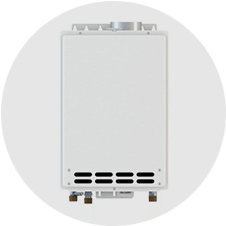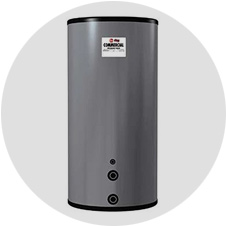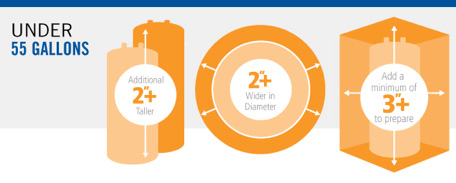WATER HEATERS
Heating water is the second-largest expense in our homes, according to the Department of Energy, accounting for 14% to 18% of our utility bills. Picking the right water heater not only affects your comfort, but your energy bills, too. Natural gas water heaters can heat up to twice the amount of water in the same amount of time as an electric model—which means you’re less likely to run out of hot water when you need it. And they cost less to operate. There are different types: the traditional storage tank water heaters and tankless.

Tankless Water Heater
Tankless Water Heaters save energy by heating water only when needed. When you turn on the hot water tap, cold water is drawn into the water heater, which heats it in a flash. Since it’s hot water on demand, you never run out of hot water.
- Up to 40% more energy efficient than tank style water heaters
- Endless supply of hot water
- No more storing unneeded hot water
- Life expectancy of more than 20 years
- Space saving over tank style

Storage Tank Water Heater
- Costs up to 62% less to operate than electric
- Heats water faster than electric
- Storage capacity from 30-100 gallons; quick heating with less cost
- Smaller tank requirements versus electric
ANNUAL APPLIANCE OPERATING COST COMPARISON
Tank Water Heater
Calculations are based on information from:
- Georgia Public Service Commission – www.psc.state.ga.us
- Energy Information Administration – www.eia.gov
- Department of Energy – www.energy.gov
ANNUAL APPLIANCE OPERATING COST COMPARISON
Tank and Tankless Water Heater
ANNUAL APPLIANCE OPERATING COST COMPARISON
Tankless Water Heater for NG and Propane
New Water Heater Regulations
As of April 16, 2015, newly manufactured water heaters must comply with new Department of Energy efficiency standards. The new standards apply to gas, electric and oil, residential tank water heaters. These changes will be good for your wallet (utility bills could be 25-50% lower), but the changes may make choosing a new water heater a little confusing. Here is some Energy Scout research from consumerreports.org and other sources that may help.
Most tankless water heaters already meet the new standards, but the typical residential tank water heaters will need to be slightly larger, and some models will discontinue. Larger units – 55 gallons or more – will need to shift to new technologies to achieve the efficiency gains. For electric units, heat pump technology must be utilized. For gas water heaters, hybrid or condensing models will be required. As a result, high-volume tank applications will increase in price.
Advantage of Using Natural Gas Tank Water Heaters
- Gas tankless water heaters will become more attractive due to their space savings and high-volume output. Because natural gas tankless water heater efficiency standards did not affect most units already in production, those unit prices should remain stable, while the price of electric tank style units should increase. Gas tankless units will be a viable option when replacing 55+ gallon electric and gas tank water heaters.
- Electric to gas conversions may be viable solutions in space-constrained and high-volume applications. Gas water heaters have much faster recovery than electric models, so a physically smaller gas unit can be substituted for a larger electric water heater with no lapse in performance.
The bottom line for consumers is, if you’re replacing a water heater that holds less than 55 gallons, the new one may be a couple of inches larger and can likely be placed where the old one was unless is was in a very tight spot such as a closet. Before making a purchase, consult your plumber or contractor.

